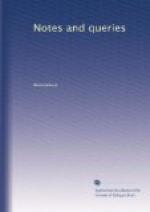There is a passage in Lucian De Dea Syria, Sec. 13., which may serve to elucidate this feature in the Nineveh marbles. He is referring to the temple of Hierapolis and a ceremony which Deucalion was said to have introduced, as a memorial of the great flood and the escaping of the waters:
[Greek: “Dis ekastou eteos ek thalasses ydor es ton neon apikneetai; pherousi de ouk irees mounon alla pasa Syrie kai Arabie, kai perethen tou Euphreteo, polloi anthropoi es thalassan erchontai, kai pantes ydor pherousai, ta, prota men en toi neoi ekchrousi,”] &c.
“Twice every year water is brought from the sea to the temple. Not only the priests, but” all Syria and Arabia, “and many from the country beyond the Euphrates come to the sea, and all bring away water, which they first pour out in the temple,” and then into a chasm which Lucian had previously explained had suddenly opened and swallowed up the flood of waters which had threatened to destroy the world. Tyndale, in his recent book on Sardinia, refers to this passage in support of a similar utensil appearing in the Sarde paganism.
It may be interesting to refer to another passage in the Dea Syria, in which Lucian is describing the splendour of the temple of Hierapolis; he says that the deities themselves are really present:—
[Greek: “Kai Theoi
de karta autoisi emphanees; idroei gar de on para
sphisi ta xoata,”]
When the very images sweat, and he adds, are moved and utter oracles. It is probable Milton had this in recollection when, in his noble Nativity Ode, he sings of the approach of the true Deity, at whose coming
“... the chill marble seems to sweat,
While each peculiar power foregoes his
wonted seat.”
L.I.M.
* * * * *
MINOR NOTES.
Gaudentio di Lucca.—Sir James Mackinstosh, in his Dissertation on the Progress of Ethical Philosophy, adverts to the belief that Bishop Berkeley was the author of Gaudentio di Lucca, but without adopting it.
“A romance,” he says, “of which a journey to an Utopia, in the centre of Africa, forms the chief part, called The Adventures of Signor Gaudentio di Lucca, has been commonly ascribed to him; probably on no other ground than its union of pleasing invention with benevolence and elegance.”—Works, vol. i. p. 132. ed. 1846.
Sir J. Mackintosh, like most other modern writers who mention the book, seems not to have been aware of the decisive denial of this report, by Bishop Berkeley’s son, inserted in the third volume of Kippis’s Biographia Britannica.




